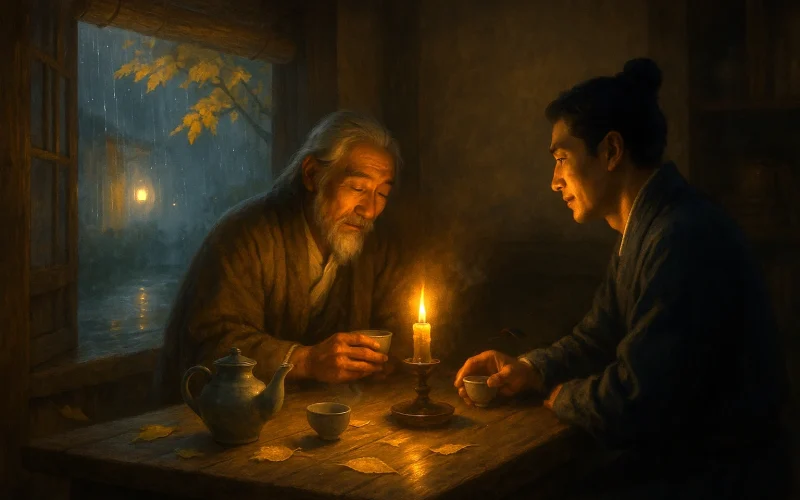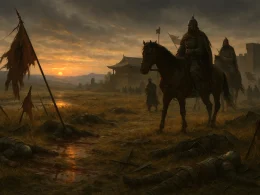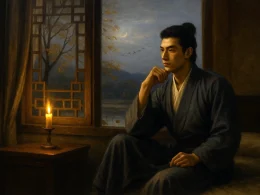In dangerous times we two came south ;
Now you g o north in safety, without me.
But remember my head growing white among strangers,
When you look on the blue of the mountains of home.
...The moon goes down behind a ruined fort,
Leaving star-clusters above an old gate...
There are shivering birds and withering grasses,
Whichever way I turn my face.
Original Poem
「贼平后送人北归」
司空曙
本以高难饱,徒旁限费声。
五更疏欲断,一树碧无情。
薄宦梗犹泛,故园芜已平。
烦君最相警,我亦举家清。
Interpretation
This poem was composed shortly after the end of the An-Shi Rebellion. Though the war had subsided, the land remained scarred and people displaced. Having fled south together during the turmoil, the poet now watches his friend return north while he remains stranded in exile, filled with wanderer's melancholy and longing for home. While framed as a farewell, the poem ultimately conveys the poet's homesickness and lament for a war-torn era.
First Couplet: "世乱同南去,时清独北还。"
Shì luàn tóng nán qù, shí qīng dú běi huán.
"Together we fled south when war raged wild; / Now peace returns - you go north alone, exiled."
This establishes their shared wartime flight and the poignant contrast of solitary return, creating profound emotional tension.
Second Couplet: "他乡生白发,旧国见青山。"
Tā xiāng shēng bái fà, jiù guó jiàn qīng shān.
"In foreign lands our hair turned white; / Returning, you'll find but mountains remain bright."
Interweaving time's passage with imagined war-ravaged homelands, it reveals deep existential sorrow.
Third Couplet: "晓月过残垒,繁星宿故关。"
Xiǎo yuè guò cán lěi, fán xīng sù gù guān.
"Dawn moon crosses ruined fortress walls; / Night stars perch on abandoned guard halls."
Imagining the desolate battlefields along the friend's journey, these vast, silent scenes amplify parting grief.
Fourth Couplet: "寒禽与衰草,处处伴愁颜。"
Hán qín yǔ shuāi cǎo, chù chù bàn chóu yán.
"Only winter birds and withered grass / Accompany your sorrow along each pass."
The concluding imagery mirrors the traveler's solitude - every bleak detail reflecting shared melancholy.
Holistic Appreciation
While ostensibly a farewell, the poem contains deeper emotional currents. The opening contrast between "together fled" and "alone returning" establishes the central tension. Middle couplets intertwine concern for the friend with anxiety for their ravaged homeland. The final scenic depiction, though describing the friend's journey, ultimately mirrors the poet's own exilic sorrow and unspoken national grief.
Artistic Merits
The poem excels in subtle emotional layers and resonant imagery. "Ruined fortresses," "abandoned passes," "winter birds" and "withered grass" construct a landscape of historical trauma. Remarkably, scenes ostensibly depicting the friend's journey simultaneously reveal the poet's inner exile - achieving perfect fusion of scene and sentiment.
Insights
Beyond personal parting, this poem bears witness to individual fates in turbulent times. It reminds us how friendship sustains through upheaval, yet how intellectuals' national sorrow persists beneath personal grief. Between reality's ruins and memory's fragments, the poet's concise yet profound verses capture an entire generation's displacement and nostalgia.
Poem translator
Kiang Kanghu
About the poet

Sikong Shu (司空曙), c. 720 – c. 790, courtesy name Wenming, was a native of Guangping (present-day Yongnian County, Hebei Province). A renowned mid-Tang dynasty poet, he was one of the "Ten Literary Masters of the Dali Era," alongside Lu Lun, Qian Qi, Han Hong, Li Duan, and others. Though his life lacked illustrious achievements, his poetry—marked by genuine emotion in simplicity and profound contemplation in solitude—secured him a unique place in mid-Tang literary circles.












